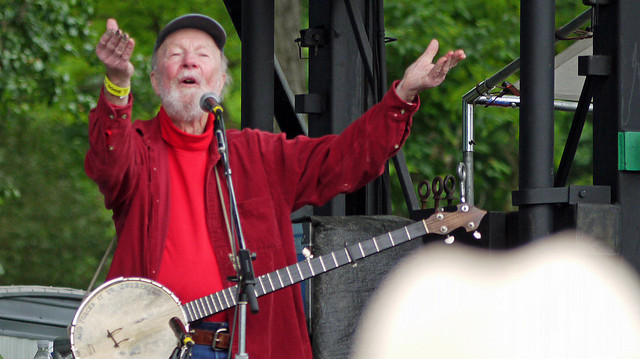You can change the conversation. Chip in to rabble’s donation drive today!
Pete Seeger, who died this week at 94, embodied a radical version of alternative culture. Not because he challenged traditional forms; as a folk singer, he embraced them (though he preferred “singer of folk songs”). Nor because he was a radical leftist ready to go to jail. He was alt as an artist because of how he did it: in total interaction with his audience. They were involved not just by responding to his performance; he insisted they perform with him; sometimes he had to hector them to do it. It didn’t come easily under the consumption model of art. The medium for his message was the singalong.
An astonishing number of Seeger albums are still available: many dozens. Most are live before audiences. They’re nearly all highly underproduced or virtually unproduced. The exceptions are the No. 1 hits he had with The Weavers in the early 1950s before the anti-communist blacklist buried them. He was essentially a figure in the Oral Tradition, versus most musicians who belong to the Written Tradition in the sense that their music is edited, perfected and sent one-way to audiences. They’re part of a print approach although they use recorded sounds instead of words on pages. Even on his recordings, Seeger strove to capture the ambience of interaction.
This is especially subversive in the concert context because it breaks down the cash nexus. You pay to go but you perform. At other concerts, the audience gets involved by dancing etc., but it’s never in doubt who’s onstage. Seeger deliberately forced a melding and sometimes even a reversal. I felt that way the first time I saw him at Massey Hall; I couldn’t believe we were singing for him!
It underscores the dilemma of all cash transactions. Should you thank the plumber or handyman though you’re paying them? In fact, most people doing service jobs want to be helpful, not just get paid. Thanking them exposes an awkwardness; it implies something more than business is going on. The French overcome the embarrassment by formalizing the exchange: merci, monsieur … merci, madame. It’s really that cash nexus which arrived late on the scene and is extrinsic to ancient human behaviour. Yet it somehow managed to take over.
The model sloshes over into Seeger’s version of left politics. People can’t ever fully trust their leaders, who will usually get carried away by power or adulation and mess up. “The people” can only ultimately trust each other, since they have less to lose. They must rely on themselves and turn to each other in the face of peril, for purely practical — not romantic or sentimental — reasons: for the sake of sheer survival in fact, as the stakes rise ever higher. “I’ve never sung anywhere without giving the people listening to me a chance to join in,” said Seeger: “as a kid, as a lefty, as a man touring the U.S.A. and the world, as an oldster. I guess it’s kind of a religion with me. Participation. That’s what’s going to save the human race.” You could say the singalong was a metaphor for all that, though you could also say the singalong came first in his life (as son of a musicologist) which extended outward and took in politics.
CBC-TV’s poor arts reporter couldn’t grasp any of it. Her obit described Seeger as a guy who started a band that had some hits, then broke up due to politics so he went solo but managed to have a good career anyway. The BBC and others weren’t much better. It just proves how alt Seeger still was, how outside the standard cultural norms, and how valuable his example remains.
If you watch videos of him getting the audience to sing, say, “Michael Row the Boat Ashore,” you can see they’re dubious at first. Then they come to believe in their ability to carry the song. That was Seeger’s main point. But it had the added advantage of allowing his striking tenor to take off and soar above them, before settling back down in their midst — thus refuting all claims about conflict between the genius and the masses, the collective and the individual, society and its members. Take that, Ayn Rand.
This article was first published in the Toronto Star.
Photo: kooky kooky/flickr



